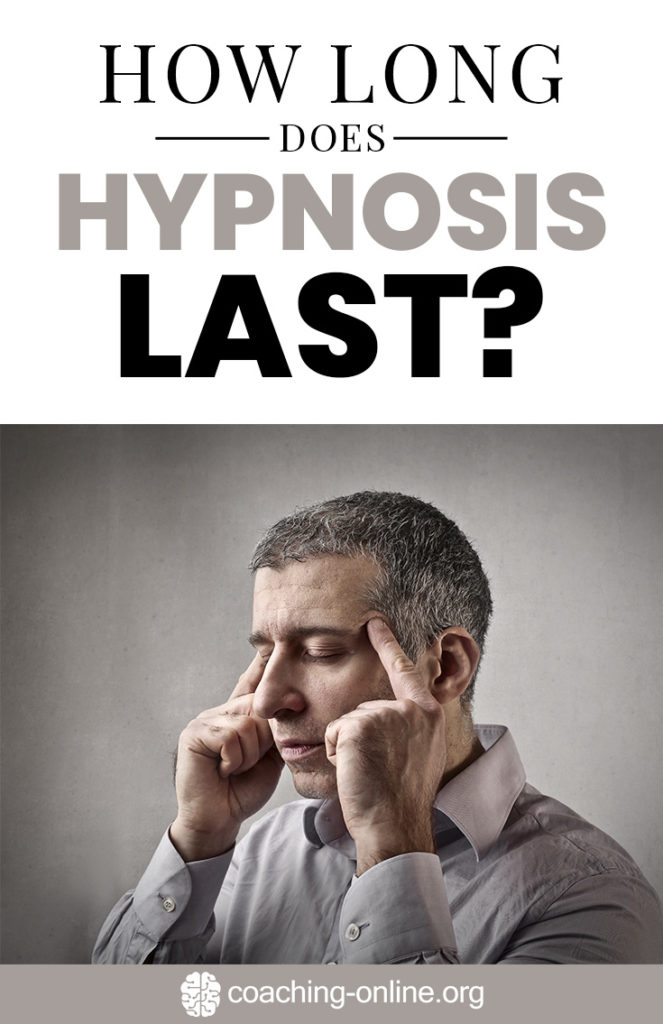Hypnosis can be used as an effective therapeutic process in helping people cope with
- pain,
- stress, and
- anxiety.
It can help someone overcome negative behaviours and habits or stuck patterns that have been difficult to see their way through.
It may also be used as part of a comprehensive program for quitting smoking or losing weight.
The effects of hypnosis can be permanent and can last a lifetime.
However, this could depend on several factors.
Often most hypnosis patients that want to quit smoking are able to quit after the first session.
For weight loss, peoples’ habits can begin to change after one session, yet require further sessions to tackle the issue completely.
And other times there can be a delay of months before change is noticed.
A lifetime of deep emotional blocks could take several sessions of treatment.
Much of the result depends on the person’s susceptibility to hypnotic suggestion, how deep the engrained pattern in the person is, and the skill of the therapist.

Can Hypnosis Wear Off?
First of all, hypnosis isn’t a thing or a state of mind.
Hypnosis is a process or a procedure that one goes through to effect positive change in their lives.
The process involves reaching a calm, relaxed feeling in the body and the use of carefully crafted suggestions while in that state.
The method of hypnosis is important here.
The way a practitioner uses suggestions around the habit or behaviour you want to change makes a difference.
Suggestion doesn’t work well with people when it sounds more like a command, or that they’re being told what to do.
It can also be rejected when it doesn’t fit with the client’s world view or values.
In those instances, with those methods, hypnosis may not work because the command method doesn’t typically work as well as the metaphor or indirect suggestion method.

Milton Erickson – Father Of Hypnosis
Metaphor and indirect suggestion is something Milton Erickson developed and is very successful.
Many hypnosis practitioners today use this method.
While in a hypnotic trance you can slow your breathing and even lower your blood pressure.
However, once you come out of trance your focus is less on your inner state so you no longer are purposely controlling those things.
People are often amazed with how quickly hypnosis can work, yet what they don’t realize, is that any brief experience – whether traumatic or therapeutic – can have a long lasting effect.
Once hypnosis has helped you overcome a negative or destructive pattern of behaviour, even something that has just bothered you for years, like blushing or shyness, the therapy can help glue your desired changes in place more strongly.
However, after time it is possible that you could go back to old habits depending on whether you’ve made appropriate changes to your environment as well.
The type of hypnotherapy used and the experience or skill of the hypnosis therapist is also a factor.
Some people find benefit in having a refresh session now and then.
Our behaviour patterns often have a root cause that could go back many years or even lifetimes.
For example, a woman who has hypnosis therapy for weight loss and has an emotional eating problem, will turn to food to nurture herself.
She may not receive a lasting benefit from simple suggestions, such as, “you always like and enjoy eating low fat foods”, “you exercise everyday”, or “you only want to eat when hungry”.
She may have some improvement, although, when she finds herself in a familiar pattern that she would normally soothe by eating, the effects of the hypnotic suggestion can wear off because it didn’t address the root cause of her emotional eating.
It would still be like treating the symptom rather than the cause.
Once your therapist has addressed all the underlying causes and secondary gains of the issue, as well as the blocks and underlying beliefs, then the issue is free to be released and will not come back.
Choose a therapist who understands this and is experienced in getting to the root cause.
How Long Does A Hypnotherapy Session Last?
The time your hypnotherapy session will last can vary.
How long it is will depend on your issue, your ability to go into trance and your therapist.
Generally, the appointment will be fifty to sixty minutes, although could last up to two hours.
First, the therapist will want to take some time to get to know you and your issue.
The actual hypnosis can vary depending on the time it takes for your mind to reach trance and for the practitioner to weave in the suggestions that will help you.
For example, the first thirty five minutes may be for getting to know you and your issue and then they may use the next twenty minutes for hypnosis.
Consecutive appointments that you may make will likely be shorter because the therapist already has much of the information they require to help you.

Qualities Of A Good Hypnotherapist
Once again, it’s very important to choose a practitioner who understands the need for addressing the underlying beliefs and blocks in order to have the most successful outcome for lasting benefit.
Also, make sure you use a therapist who is qualified with the right credentials this way you will be sure to have your rights reserved.
Hypnosis can be a long lasting treatment for many difficult blocks, destructive behaviours and habits, or even personality traits such as shyness and lack of confidence.
Pain, stress, and anxiety are all symptoms of many of these issues.
So it can be well worth giving hypnosis a try.
Related Posts
